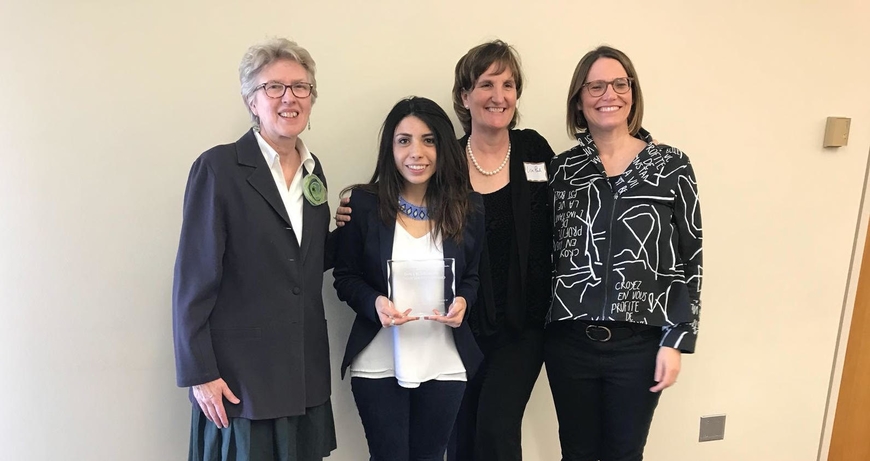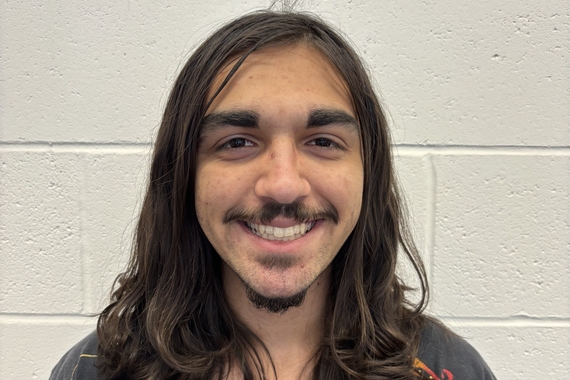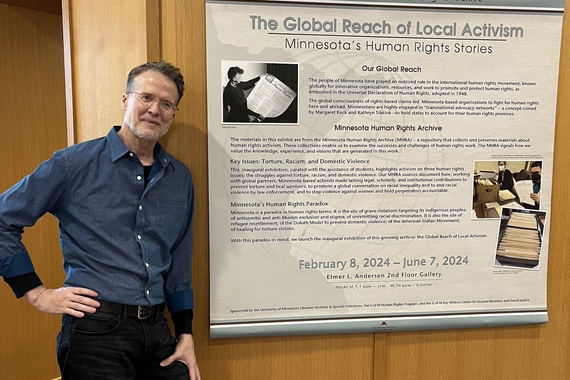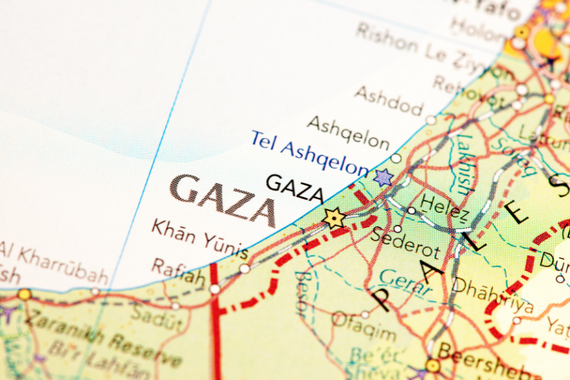Passion into Practice: Applying Human Rights Knowledge Beyond the Classroom
HRP (Human Rights Program): When did you receive the Inna Meiman Undergraduate Human Rights Award? How did it impact and/or support you in your education?
Nicole Donoso (ND): I received the Inna Meiman Human Rights Award in April 2018, thanks to my professor Lisa Hilbink who nominated me. The award served as a recognition of my commitment to human rights and justice. It gave me hope and the energy to continue fighting for the dignity and fundamental human rights of people.The award was a celebration of all my experiences that shaped the person who I was, a humble human rights student that woke up every day with the desire to make things better. An undergraduate student that truly understood that a dignified life should be a right and not a privilege.The funding of the award helped me to pay for my flight to Amsterdam. I went there to participate in an exchange student program at the University of Amsterdam during the fall of 2018. There, I was able to complete my Bachelor’s degree in Global Studies with a concentration in Human Rights and Justice in Latin America. I was very thankful for the award. It really helped me to afford my exchange student experience.
HRP: What human rights work were you involved with prior to receiving the award?
ND: During my two years at Riverland Community College in Austin, Minnesota, I had the opportunity to help the Hispanic-immigrant community. Due to the high number of jobs at Hormel, the Hispanic community had the need to communicate and seek legal advice regarding access to education and work permits. I volunteered to translate at schools, at legal clinics, and at the mobile Mexican Consulate there. Quickly, I became not just a linguistic support, but also a friend for immigrant families. I gave Mexican mothers rides to grocery stores because they did not have driver’s licenses and their husbands were busy at work. I also volunteered to teach them English at the Adult Learning Center. In gratitude, many of these families invited me to eat amazing tacos and cake at their kids’ birthday parties. Through these experiences I got to know the undocumented-immigrant community better. I saw with my eyes their fear of being deported by the ‘migra’ (Immigration Officers). I saw how kids were ashamed of their parents because they neither had legal papers nor spoke English fluently. Soon I understood my privilege of being a bilingual U.S citizen (a legal immigrant), and the need to use it to change the unfair immigration system in the U.S that allows such horrible things to happen.
At the UMN, I had the opportunity to be part of the Human Rights Program as a student researcher on the Observatory on Disappearances and Impunity in Mexico. From this experience I learned about Mexico’s weak response to and compliance with disappearances and the exhausting but crucial coding process that human rights researchers do. I hope in the future to use this knowledge to lead my own research project in Colombia.
Last year, I was an intern at the James H. Binger Center Center for New Americans (CNA) at the Law School. I had the opportunity to interpret for Professor Linus Chan and for law students at the immigrant detention centers. Thanks to this internship, now I can advise immigrant families with substantial information about their rights and the resources that exist for them in the Twin Cities area. With the CNA, I was able to visit Sherburne County Jail as an interpreter and get to know a variety of detainees with different backgrounds. In their eyes I saw the same fear that the immigrant families in Austin had. Their fear has stayed with me as a reminder that there is so much to do for this community. I accompanied the CNA on a visit to Austin, MN, for a Know Your Rights event. With this visit I saw the friendly immigrant families that I helped once and continue to advocate for their rights. Having the opportunity of interpreting for detainees and advising immigrant families gave me hope and the energy to continue fighting for the dignity and fundamental human rights for the immigrant community.
Also during my internship, I contributed to a newly funded project “Promoting Transparency and Engagement in U.S. Immigration Court by Ensuring the Quality and Utility of Data Collected by Volunteer Observers,” which the the University of Minnesota’s Human Rights Initiative approved $47,087 in funding for the 2019 calendar year. I was in charge of entering the volunteer’s information into the database. Also, in conjunction with my internship colleagues and Professor Chan, we redesigned the database to include soft data.
HRP: Have you been in human rights work since receiving the award? What did you do after receiving the award?
ND: I went to Amsterdam from August 2018 to February 2019. I attended the University of Amsterdam. There, I amplified my knowledge about Islamic Political theory, political leadership theory, and Politics of Gender and Race in (post) Colonial history. All those courses complement my understanding of the European perspective on the aforementioned topics. While I was in The Netherlands I went to the International Criminal Court, in The Hague. There I observed a continuance trial: Gbagbo and Blé Goudé Case. Laurent Gbagbo is accused of four counts of Crimes Against Humanity: murder, rape, other inhumane acts or – in the alternative – attempted murder, and persecution. Also, I went to Amnesty International to volunteer in their letter writing program. There, we wrote letter to human rights advocates that are facing persecution, or are in jails in their own countries.
HRP: Where are you now and what are your plans for the future?
ND: I just returned to Minnesota a month ago from Amsterdam. Now, I am in the process of choosing a Master in the Corporate Social Responsibility field or Development Practice. I am applying to do my Masters at a university in The Netherlands. In the far future I will be back to Bogotá, Colombia (my hometown) to apply all my international knowledge, perspectives and skills. I hope to fight for Colombia’s democracy and human rights. I know I will not eliminate human rights violations in Colombia, but at least I will have more knowledge and skills to try to do so.

**Responses have been edited for clarity and length.



